Events
Stay up-to-date with the latest happenings, exciting developments, and upcoming events within the DDP network. Here, we bring you an overview of all the news and activities that shape our community.
Read our NDC-Insights series
Download or read online bulletin 2025 #10
Download or read online bulletin 2025 #9
Download or read online bulletin 2025 #8
Download or read online bulletin 2025 #7
Download or read online bulletin 2025 #6
Download or read online bulletin 2025 #5
Download or read online bulletin 2025 #4
Download or read online bulletin 2025 #3
Download or read online bulletin 2025 #2
Download or read online bulletin 2025 #1
Read our quarterly bulletin
- –
- Meeting
- 2025
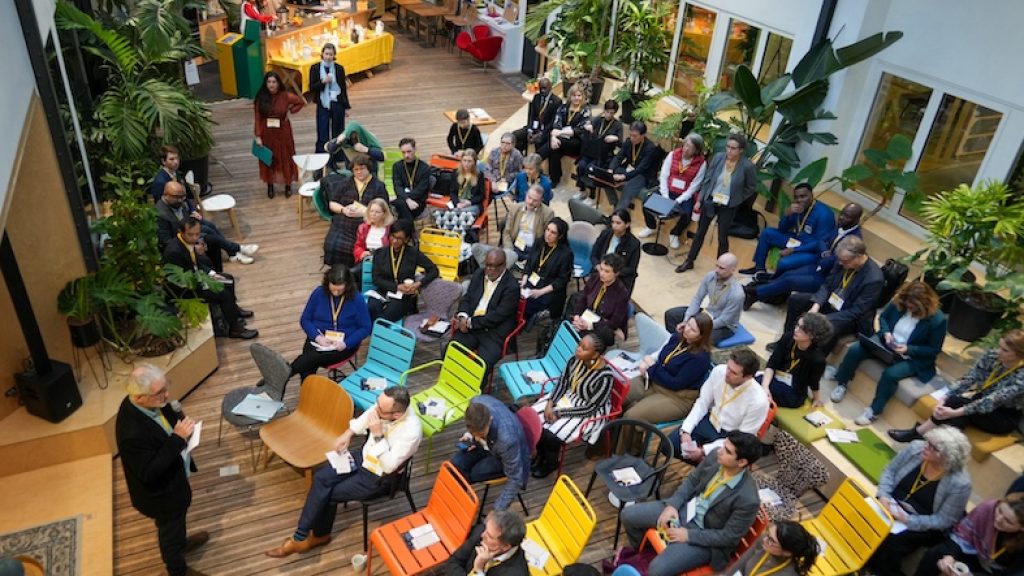
Participation in the REN21 Steering Committee Meeting
- –
- Meeting
- January 9, 2026
Participation in the REN21 Steering Committee Meeting
- Argentina
In December, Ignacio Sagardoy from Fundación Bariloche joined colleagues from around the world to take part in the Steering Committee meeting of REN21, one of the leading global organizations dedicated to promoting renewable energy as a key pathway to decarbonizing economies.
The meeting proved to be highly productive, offering a valuable forum to reflect on the challenges ahead while also providing insights into concrete initiatives that are actively driving the global deployment of renewable energy.
At Fundación Bariloche, collaboration with organizations such as REN21 reflects a broader institutional commitment to advancing a just energy transition—one that not only reduces greenhouse gas emissions, but also expands access to energy services and supports sustainable development worldwide.
- –
- Workshop
- 2025

Presentation of Distributed Energy Futures for Argentina: A Coupled Energy-Economy Scenario Analysis to 2050
- –
- Workshop
- January 8, 2026
Presentation of Distributed Energy Futures for Argentina: A Coupled Energy-Economy Scenario Analysis to 2050
- Argentina
The PhD Student of Fundación Bariloche, Aliosha Behnisch, participated in the 18th Annual Meeting of the Integrated Assessment Modelling Consortium (IAMC) held in Búzios, Brazil, from November 11th to 13th, presenting “Distributed Energy Futures for Argentina: A Coupled Energy-Economy Scenario Analysis to 2050”. The presentation, based partly on modeling work developed during the DDP IMAGINE project, highlighted the challenges and opportunities of transitioning Argentina’s energy system towards sustainability, emphasizing the potential for DER technologies in the country’s transition and development strategies. Coupling energy and economy models, the research explored pathways to balance energy demands, economic development, and environmental goals, providing insights into policy options for achieving a just and sustainable transition in Argentina. This contribution underscores Fundación Bariloche’s commitment to advancing knowledge and dialogue on sustainable energy solutions in developing countries.
- –
- Meeting
- 2025
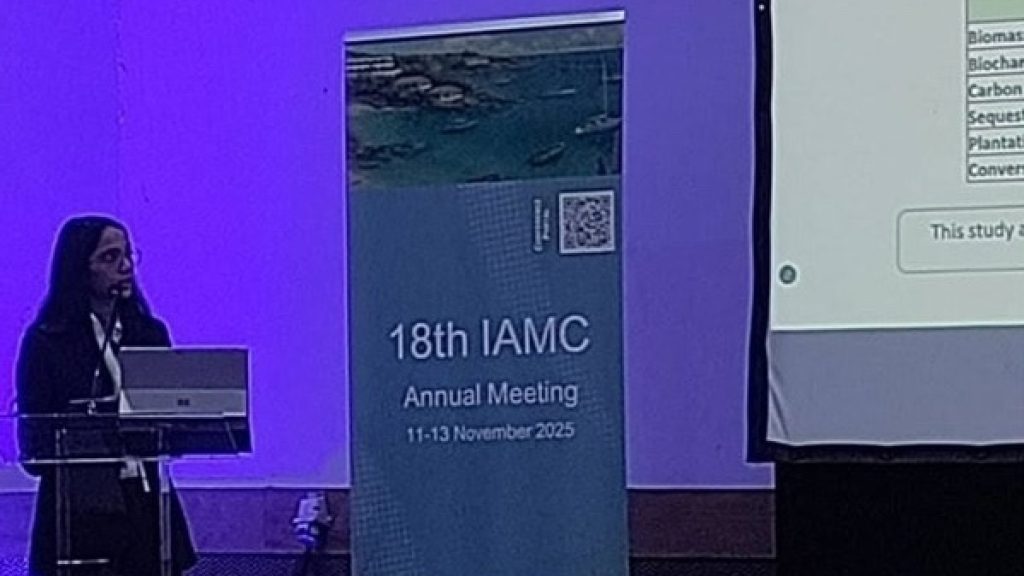
Eighteenth IAMC Annual Meeting 2025
- –
- Meeting
- January 7, 2026
Eighteenth IAMC Annual Meeting 2025
- India
Participation in the 18th Integrated Assessment Modeling Consortium (IAMC) Annual Meeting held between November 11 to 13 at Búzios, Brazil.
- Presentation on Modelling rice land-demand pathways in India using the AFOLU-B model, assessing the impacts of population by Joyal Arya.
- Presentation on Rice methane mitigation, highlighting that cost-neutral and cost-saving options, particularly Direct Seeded Rice (DSR) offer the highest CH₄ abatement potential, with greater reductions achievable under integrated mitigation scenarios by Qumer Ahmed Khan.
- Presentation on assessing the potential of bamboo-based biochar for decarbonising India’s steel sector, using spatial analysis to evaluate land availability and mitigation potential by Rutva Patel.
- Poster Presentation (online) on “From National to Subnational Policies: Assessing GHG Emission Mitigation from Key Policies of Gujarat State, India” by Jyoti Maheshwari
- Workshop
- 2025
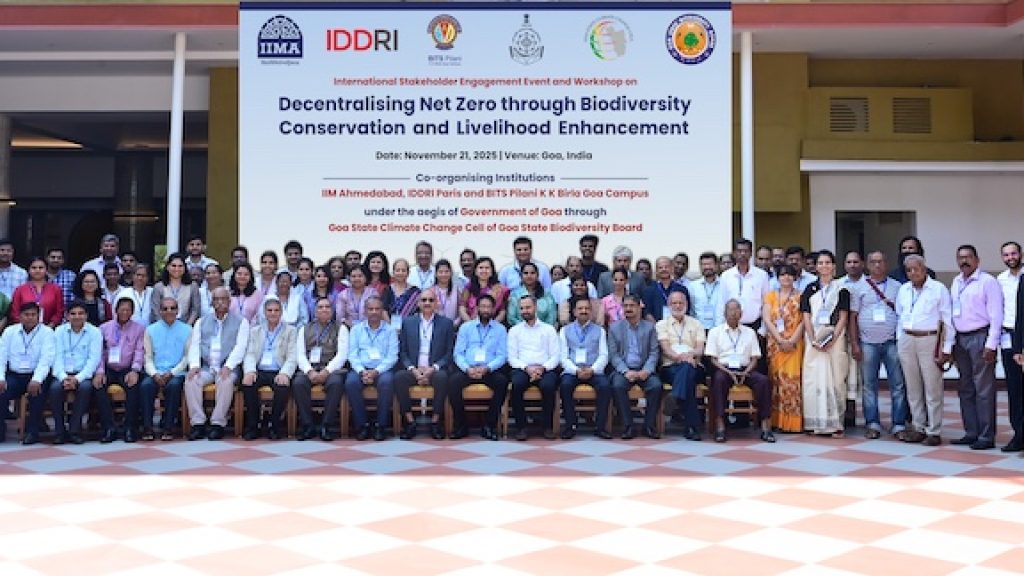
Goa Stakeholder Engagement Event and Workshop 2025: Decentralizing Net Zero through Biodiversity Conservation and Livelihood Enhancement
- Workshop
- January 7, 2026
Goa Stakeholder Engagement Event and Workshop 2025: Decentralizing Net Zero through Biodiversity Conservation and Livelihood Enhancement
- India
As part of another project with IDDRI (IKI-WRI – 2050 is Now), IIMA in association with IDDRI Paris, BITS Pilani K K Birla Goa Campus under the aegis of Government of Goa through Goa State Climate Change Cell (GSCCC) of Goa State Biodiversity Board (GSBB) conducted a stakeholder engagement event and workshop in Goa on November 21, 2025. This exercise was undertaken before commencing modelling and scenario development activity to help define the focused modelling efforts and scenario development in alignment with Goa’s vision and plans for climate action and energy transition.
Around 120 participants attended the event representing the Government of Goa (Goa State Biodiversity Board, Government of Goa’s Forest Department, Goa Energy Development Agency, Goa State Climate Change Cell, Goa State Council for Science and technology, Goa State Pollution Control Board, Goa Waste Management Corporation, Goa’s Department of Environment and Climate Change, Goa State Wetland Authority, Water Resources Department), Educational and Research institutions (Goa State Research Foundation, BITS Pilani K K Birla Goa Campus, Carmel College of Arts, Science and Commerce for Women Goa, ICAR-Central Coastal Agricultural Research Institute, National Centre for Polar and Ocean Research), Civil society representatives (Biodiversity committees from various villages, Act for Goa, CEE Goa, TERI Goa, Vivekananda Environment Awareness Brigade), and industry/ entrepreneurial ventures (TATA Sustainability Group, NABARD, Sunrise CSP India Private Limited, Little Himalayan Private Ltd, Eco Green Unit Foundation).
The event, titled “Decentralizing Net Zero through Biodiversity Conservation and Livelihood Enhancement,” focused on bridging the gap between global climate policies and practical grassroots implementation. Goa’s unique energy profile is the main concern, as the state imports nearly 75% of its electricity, and about 60% of its GHG emissions are contributed by its transport sector. Experts proposed various nature-based solutions, such as planting Pandanus along dunes to prevent coastal erosion while simultaneously supporting local artisanal livelihoods. Other economic opportunities identified included processing indigenous resources like wild mangoes and jackfruit to foster voluntary community conservation. Technological discussions highlighted successful waste-to-energy plants converting wet waste i.e., methane to electricity. However, implementation gaps persist; for instance, rooftop solar adoption lags due to low electricity tariffs despite state subsidies. Panelists advocated for decentralized innovations, such as portable food-processing machines and biogas units, to strengthen rural financial stability and encourage the transition to clean energy. The event concluded that community engagement and empowerment are indispensable to the net-zero mission. Ultimately, the workshop underscored that there is no one-size-fits model and highlighted the need for people-centric strategies that respect the regional socio-economic constraints and cultural contexts.
- DDP
- Event
- 2025

LCS-RNet 16th Annual Meeting – 10 Years Since the Paris Agreement: Progress and Challenges in Climate Action
- DDP
- Event
- December 18, 2025
LCS-RNet 16th Annual Meeting – 10 Years Since the Paris Agreement: Progress and Challenges in Climate Action
- Brazil, Europe, France
On 18-19 December, the Leveraging a Climate-neutral Society Strategic Research Network (LCS-RNet) will hold its 16th Annual Meeting online. This year’s theme is “Ten Years Since the Paris Agreement: Progress and Challenges in Climate Action.” The meeting will feature two keynote speeches, three thematic sessions and one panel discussion, bringing together international and domestic experts to share their latest insights.
In the keynote sessions, Henri Waisman (IDDRI, DDP), will review global progress in national climate policies, while Prof. Harald Winkler (University of Cape Town, UCT) will discuss key issues emerging from the Global Stocktake. Other DDP speakers include: Emilio Lebre La Rovere, Federal University of Rio de Janeiro, Brazil, Saritha Sudharmma Vishwanathan, Céline Kauffmann, IDDRI (TBC) please see full detail agenda here
The thematic sessions will address implementation and governance challenges in areas such as agrivoltaics, sustainable cities under a changing climate and the role of public participation.
Established following a proposal at the G8 Environment Ministers’ Meeting, LCS-RNet has long contributed to climate policy processes by providing research-based knowledge. This annual meeting aims to foster mutual learning and support practical implementation efforts. We warmly invite your participation.
- –
- Report
- 2025
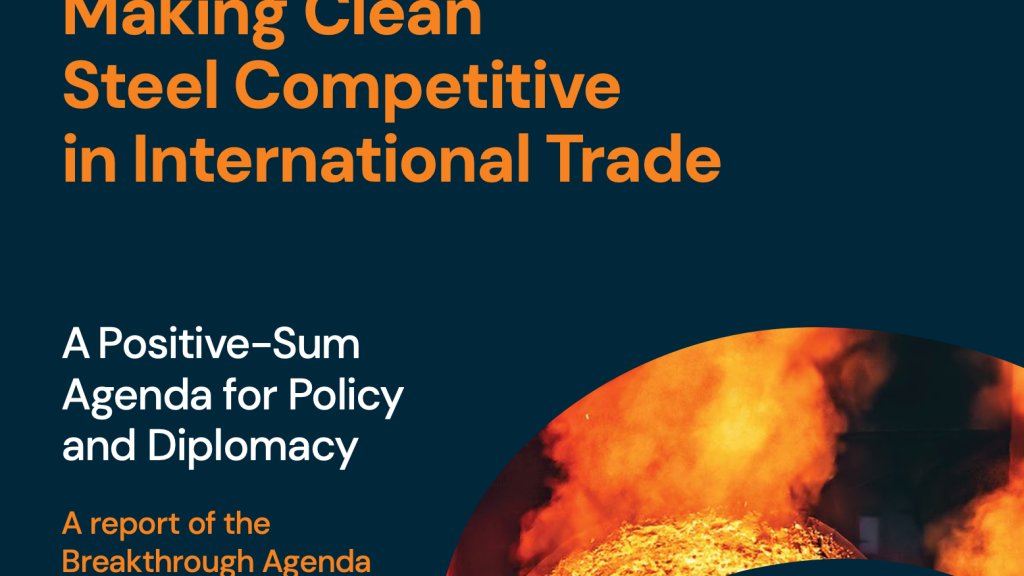
Making Clean Steel Competitive in International Trade: A Positive-Sum Agenda for Policy and Diplomacy
- –
- Report
- November 19, 2025
Making Clean Steel Competitive in International Trade: A Positive-Sum Agenda for Policy and Diplomacy
This report of the Breakthrough Agenda Policy Network (African Centre for Economic Transformation [headquartered in Ghana], Chatham House [UK], Council on Energy, Environment and Water [India], Energy Foundation China [China], IDDRI [France], Institute for Global Environmental Strategies [Japan], Institute of Climate and Society [Brazil], and Instituto E+ Transição Energética [Brazil]) proposes that major steel producers such as China, India, and the EU, along with potential green iron exporters such as Australia, Brazil, and South Africa, should begin a diplomatic process to create and grow global markets for clean iron and steel.
–
While carbon pricing has dominated policy debates, the report finds that targeted clean steel subsidies are likely to be essential to unlock investment in new primary steelmaking technologies. These can be designed to be revenue-neutral for governments, low-cost for consumers, and risk-free for industrial competitiveness. Other demand-creating policies, such as public procurement and potentially clean steel mandates, can also play a complementary role.
With clean steel accounting for just 0.1% of global production, multiple projects delayed, and rising trade tensions, the report also suggests a new diplomatic focus on trade and steel at the international level: tariff exemptions for clean steel, green iron offtake agreements, agreed principles on clean steel subsidies, and common definitions and standards. These measures, it argues, are likely to offer a more practical route to global cooperation than efforts to align carbon prices, and can shift current debates on trade in steel from negative-sum to positive-sum dynamics.
Launched at COP30 in Brazil, the report — Making Clean Steel Competitive in International Trade — brings together research from Europe, China, India, Brazil, and Africa. It proposes that major steel producers such as China, India, and the EU, along with potential green iron exporters such as Australia, Brazil, and South Africa, should begin diplomatic talks on measures to create and grow global markets for clean iron and steel.
Download the report at: https://www.scurveeconomics.org/publications/making-clean-steel-competitive-in-international-trade
- DDP
- Event
- 2025

How has the Paris Agreement shaped mitigation policy? Assessing progress at ten years
- DDP
- Event
- October 29, 2025
How has the Paris Agreement shaped mitigation policy? Assessing progress at ten years
- Europe, France
Online | Nov 17, 2025 | 2:00 PM – 3:30 PM
As the Paris Agreement marks its 10th anniversary, this session organized by OECD (opening remarks by Walid Oueslati, Head of Climate, Biodiversity and Water Division, and moderation by Elisa Lanzi, Senior Economist, Climate Mitigation, OECD) explores its impact on climate change mitigation action and policies.
Drawing on insights from a novel global OECD survey of policymakers and non-governmental experts, this session will highlight how the Agreement has shaped national mitigation policies, the barriers that continue to hinder implementation and the policy priorities moving forward.
Henri Waisman, Director of the Deep Decarbonization Pathways programme, IDDRI, will present the 2025 DDP report: A Decade of National Climate Action: Stocktake And The Road Ahead.
The OECD will present key findings from the survey, presented in the recently published report “The Paris Agreement at Ten Years: Expert Views on Progress and Challenges for Climate Change Mitigation”. A panel of experts and stakeholders will then reflect on progress made, remaining gaps and next steps to highlight how climate action can evolve to meet the urgency of the climate crisis.
- 2050 is Now
- Event
- 2025
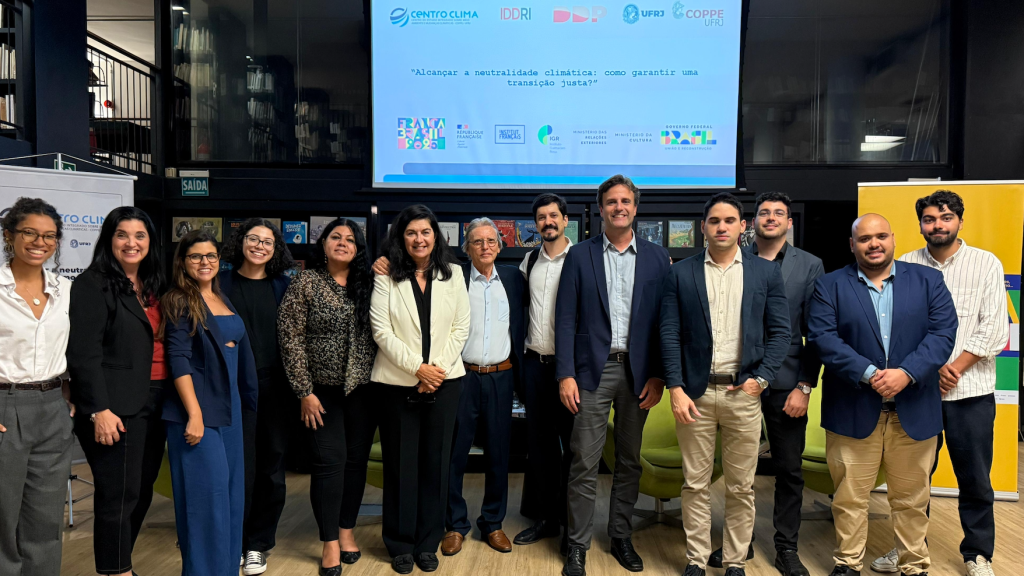
Achieving carbon neutrality: how to ensure a just transition?
- 2050 is Now
- Event
- October 24, 2025
Achieving carbon neutrality: how to ensure a just transition?
- Brazil, France
Centro Clima / Coppe / UFRJ/ IDDRI and partner institutions gathered on Wednesday, October 8, at the Consulate General of France in Rio de Janeiro, to debate the theme “Achieving Climate Neutrality: How to Ensure a Just Transition?”. With simultaneous translation available, international specialists discussed decarbonization, just energy transition, and climate change, key themes of the Paris Agreement.
The seminar was promoted by Centro Clima, a laboratory linked to the Energy Planning Program (PPE/Coppe/UFRJ), in partnership with the Institute for Sustainable Development and International Relations (IDDRI) and the World Resources Institute (WRI), with support from the Consulate General of France and the Institut Français. It is labeled as part of the 2025 France-Brazil Crossed Season.
The aim was to discuss the conditions that allow large emerging economies, such as Brazil, to advance towards carbon neutrality in a socially just manner, combining economic growth with the reduction of inequality and poverty.
Among the participants there were key decision-makers such as Ambassador André Corrêa
do Lago, president of COP30; Ana Toni, Executive Director of COP30; Céline Kauffmann, from IDDRI; Jean-Charles Hourcade, from CIRED; Professor Emilio La Rovere, coordinator of Centro Clima/Coppe/UFRJ; researchers Carolina Dubeux and William Wills, also from Centro Clima; in addition to Professor Suzana Kahn, Director of Coppe/UFRJ, and Professor Marcello Campos, Vice-Director of the institution.
The meeting had as the starting point the discussions of the 2025 Report – A Decade of
Climate Action: Balance and Perspectives, launched on October 6 at the Brazilian Embassy in Paris, by the Deep Decarbonization Pathways (DDP) initiative.
The event was also part of the international project “2050 is Now”, coordinated by IDDRI in partnership with WRI, Centro Clima/Coppe, and other international institutions, with support from the International Climate Initiative (IKI) of the German government. The project promotes dialogue among experts from various countries to identify challenges and opportunities for international cooperation, supporting governments in developing long-term low-emission development strategies (LTS).
By actively participating in these initiatives, Coppe/ UFRJ reaffirmed its strategic role in the scientific and technical formulation of solutions for addressing climate change, contributing to Brazil and the world advancing towards a just, inclusive, and sustainable energy transition.
The seminar had a duration from 8:30 a.m. to 6:00 p.m., with simultaneous translation in Portuguese, French, and English, and was held in a hybrid format, with in-person attendance and online transmission via Zoom.
Presentation and full agenda of the event (pdf)
Session 1a – Download the presentation from Henri Waisman, DDP programme Director, IDDRI
Session 1b – Download the presentation from Prof. Emilio Lèbre La Rovere Centro Clima / COPPE / UFRJ
Session 2a – Download the presentation from Marat Torres-Gunfaus, Climate programme Director, IDDRI
Session 3a – Download the presentation from Prof. Emilio Lèbre La Rovere Centro Clima / COPPE / UFRJ with Carolina Dubeux and William Wills
Session 4a – Download the presentation from Jean-Charles Hourcade, Director, Cired-CNRS, France
- DDP
- Publication
- 2025

A Decade of National Climate Action: Stocktake And The Road Ahead
- DDP
- Publication
- October 7, 2025
A Decade of National Climate Action: Stocktake And The Road Ahead
Ten years on from the Paris Agreement the report “A Decade of National Climate Action: Stocktake and the Road Ahead” analyzes what has been the real effect of the Paris Agreement on climate action.
Complementarily to globalheadlines, the report is grounded on a detailed analysis of climate action at the national level from DDP experts across 21 countries, representing a diversity of geographies, levels of development, and sizes.